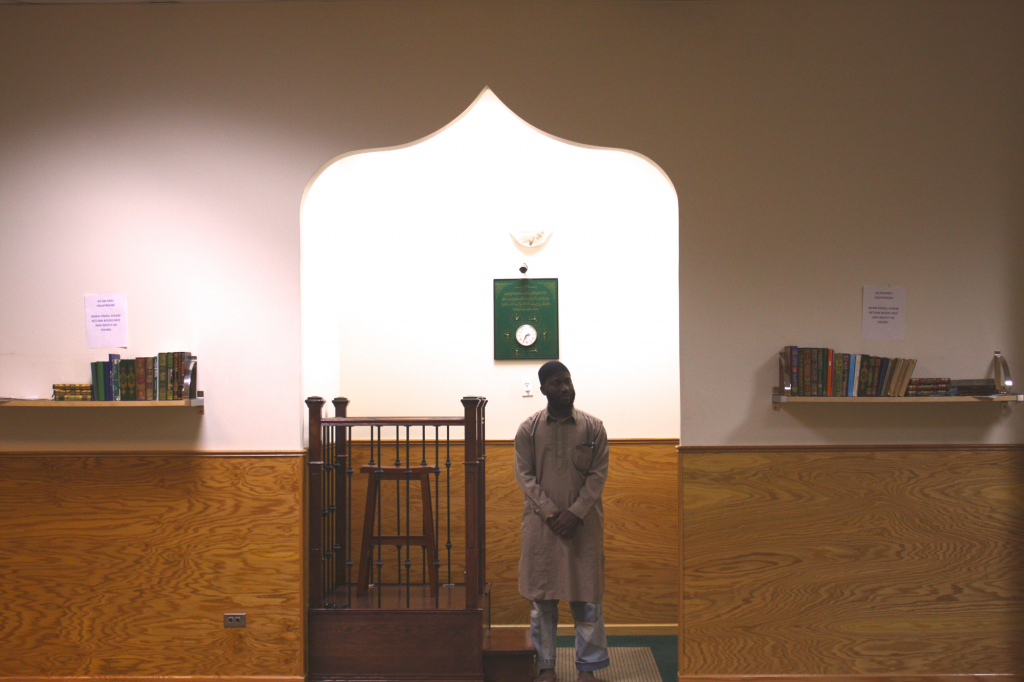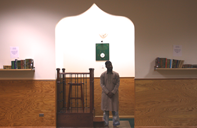
Masjid Al Farooq, located in Calumet Heights at the intersection of 89th Street and Stony Island Avenue, considers itself one of the main Islamic centers on the South Side. The closest place of Islamic prayer that isn’t in a storefront or house is Masjid Al- Faatir, located about forty blocks away at 47th and Woodlawn. But Al Farooq was not always such a formidable establishment: it began as a group of men praying in the basement of a house, until a Malian immigrant named Ousmane Drame moved to Chicago and became their imam.
Drame moved to Chicago and joined the congregation in 2002, back when it was an ethnically homogenous group of West African men. In the twelve years since the mosque’s inception, he has traveled with it from 75th to 71st to 89th Streets, and outside of it from city to city and state to state to raise funds to buy the property that is currently Masjid Al Farooq. “I drove personally from here to Miami when collecting money for this place. It’s almost sixty hours of driving,” Drame explained with pride.
Today, the mosque is incredibly ethnically diverse—rare in an extremely culture-oriented faith like Islam, as evidenced by the dimly-lit prayer room that ropes men and women off from one another. Pakistani men laugh and converse with West African immigrants—both parties’ mother tongues peek through their English. Around them, African-American and Middle Eastern congregation members perform du’a, a personal communication with Allah. Drame himself stands at the front of the congregation, his short frame full of faithful conviction, speaking in broken English to a member inquiring about prayer times.
The cost of the property was roughly one-million dollars, according to Drame, but only a tenth of that money had its origins on the South Side. The majority of it came from connections the imam built on his drive across the country, and it was all contributed for zakat, one of the five pillars of Islam, which mandates a donation of 2.5 percent of one’s wealth (if they are above the poverty line) to their local Masjid (synonymous with the term “mosque”) with the aim of helping the poor and “those whose hearts are inclined toward Islam,” in Al Farooq’s case. In fact, almost all of Al Farooq’s community-oriented programs are sustained by the zakat from not only congregation members, but also residents of the South Side at large.
These programs include the transformation of the mosque into a food pantry every Friday, a counseling program for mental and physical health concerns, a “matrimonial service,” and a “halfway house for the needy”—though all of these largely beneficial resources either aimed at or were originally intended for the purpose of da’wah, the proselytization of Islam.
While Imam Drame says that their “door is open for everyone,” Al Farooq’s website calls this food a “means to purchase the heart of those inquiring about Islam and becoming Muslim.” The matrimonial service focuses on finding suitable spouses for female members of the congregation based on “compatibility as it relates to religion.” Even the application process for the needy housing program, which Drame explains as “five houses owned by the mosque used for the purpose of housing those who happened to be kicked out of their houses,” favors those who want to become Muslim but don’t want to be tempted by the wrong things. In short, the mosque offers its services to anyone who desires them, fostering a community that is racially and socioeconomically diverse but largely religiously uniform.
The mosque also offers a janazah (Arabic for “funeral”) funding program. “Ninety percent of the people around here have no life insurance,” recounts Drame. “I’ve seen somebody left with a dead family member for three weeks before we come up with the necessary funds to do the janazah. Now the brothers are required to pay ten dollars, and sisters [are required to pay] five dollars. So we keep the money aside and if a death happens, we just take the money and pay the funeral expenses.” The program benefits those who aren’t a part of the congregation in the greater South Side areas with funeral expenses as well.
In addition to these community-oriented programs, Al Farooq tries to serve the youth of the area through weekend Islamic studies classes and a Hifz program, which helps children memorize verses of the Qur’an. Drame revealed that the mosque is working on creating a new youth center as well. “If you look at it, Muslim kids on the South Side, they don’t have a center if they want to play basketball or something,” one congregation member says. “They have to go somewhere where the area is not conducive to them. It doesn’t help their faith.”
Currently, Al Farooq’s youth academy teaches 120 children, ages five to seventeen, about Islam with the help of only eight volunteer teachers. The mosque’s board, comprised of two women and fifteen men, including Imam Drame, created this academy in order to combat the lack of resources available for South Side Muslim youth. “Of course we have [an Arabic] program in the suburbs and elsewhere, but it’s so expensive.” Drame notes. “You have to pay six to seven hundred dollars per child a month and people that are living here, they are low-income families…that’s an obstacle. And besides that, there’s a bitter but true racism. The kids from the South Side have a hard time being admitted into those boarding schools. Any time I take a child there they will give me lots of reasons, but later on I find out that they just have a problem admitting a kid from here because of stereotyping.”
Though Masjid Al Farooq’s inclusivity extends beyond race and culture to offer resources to people of systematically neglected socioeconomic backgrounds, at the end of the day it is still a religious institution.


Imam Drame, I miss you. I don’t have a mosque in Indianapolis. I haven’t been to prayer or Juma for a long while, can’t speak or read Arabic, but Allah has been good to me none the less. Allah bless you, and keep you!